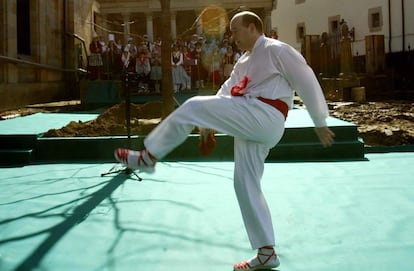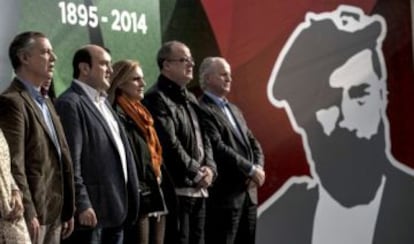Why two Basque surnames are essential to get ahead in politics
Research shows that a double-barreled second name helps with a career in nationalist circles

New research by a former head of the Basque Country University shows how political institutions in the northern region heavily favor the hiring of individuals with Basque surnames.
A study of the surnames of people working in municipal, provincial and regional government agencies shows a clear statistical overrepresentation of Basque names compared with their incidence in the total population.
Using 1998 census data, the study shows that residents with two Basque surnames – one for the father, one for the mother, using Spanish naming customs – represented 20.4 percent of the entire population of the Basque Country.
Basque surnames seem to convey a greater sense of authenticity, as though representing some über-Basqueness whose remote origins remain shrouded in mystery
Those with one Basque and one Castilian Spanish surname made up 25.4 percent, while those with two Spanish surnames accounted for 54 percent.
In fact, the most common surnames in the Basque Country are the very Castilian-sounding García, Fernández and González, according to Civil Registry records. The first Basque surname, Aguirre (alternatively spelled Agirre), shows up in 17th position.
Yet Manuel Montero’s study proves that Basque nationalist parties overwhelmingly favor politicians with local surnames for positions at all levels, and that this trend has been going on for decades even though it had not surfaced in research until now.
“The weight of surnames in nationalist organizations is extremely high, much higher than in Basque society,” says Montero, a former rector at the Basque Country University. “This peculiarity, which is more visible than other measurable variables, meets with public silence. The public discourse conceals it, denies it or glosses over it.”
In Montero’s view, this bias overrates one part of society and undervalues the other, and proves that nationalism has not embraced people without Basque surnames in a statistically normalized way.

The disconcerting revelation underscores how one’s name still carries a lot of weight in Basque politics and society, even though Basque nationalists – in both their moderate and radical versions – long ago renounced the original definition of “Basqueness” as something associated with ethnic attributes.
“To claim ethnic identity as a basis for political organization entails denying the political principle of equality for all the citizens of a given territory,” notes the scholar.
The pre-eminence of Basque surnames in the regional parliament today is evident. Of the 48 nationalist representatives in the chamber, 32 sport two Basque surnames, 10 have one of each, and only six have two Spanish last names. Among the non-nationalist forces in the house, surnames reflect the social reality much more faithfully.
Race and religion
When the Basque Nationalist Party (PNV) formally dropped race and religion as distinctive traits of the true Basque individual – traits defined by 19th-century party founder Sabino Arana, also considered the father of Basque nationalism – it seemed like ethnic criteria would be increasingly irrelevant in regional politics.
It also stood to reason that radical nationalists, who place the stress on speaking the language and have been more welcoming of foreign-born Basques, would not be stuck on the old nationalist obsession for purity of surnames.
“The weight of surnames in nationalist organizations is extremely high, much higher than in Basque society”
Yet this new report clearly indicates that the radical political left born out of ETA circles does not lag behind the conservative PNV when it comes to selecting personnel based on their names.
“There were no significant differences in the makeup of candidate lists belonging to moderate and radical nationalism,” says Montero.
López de Haro
The fact is that many Castilian surnames have been around for centuries. Diego López de Haro, lord of Biscay, founded Bilbao on June 15, 1300. Yet nationalist politicians have always treated Spanish surnames as somehow less genuinely Basque. Surveys show that Basque citizens share this view to some extent, but not enough to grant them political superiority.
In small towns such as Mondragón, population 22,000, half of registered residents bear Spanish surnames, yet there is not one nationalist candidate with a Spanish last name.
In the de facto Basque capital of Vitoria, only seven percent of the population has two Basque surnames, while 26 percent have one and 66 percent have two Castilian surnames. Yet nationalist candidates show percentages of 31 percent, 43 percent and 26 percent, respectively.

As for appointed officials, in June 2013, when the PNV was in full control of the regional government, practically half of the positions of confidence were awarded to individuals with two Basque surnames.
The former head of the Basque Country University says there are only two explanations for this trend.
“Either nationalism makes inroads mostly in a social environment that recognizes the importance of Basque surnames, or else nationalism takes surnames into account when it selects its candidates,” he says. “There is no possibility of this being a random occurrence.”
It does seem true that Basque nationalism has found many followers in rural areas where Basque is spoken at home, and where Basque surnames are much more prevalent than in the cities. But that alone cannot explain the results.
And even outside the Basque Country itself, Basque-sounding surnames seem to convey a greater sense of authenticity – as though representing some kind of über-Basqueness whose remote origins remain shrouded in mystery.
This feeling was captured to perfection by Ocho Apellidos Vascos (or, Eight Basque Surnames), a 2014 comedy that has become the highest-grossing movie in Spanish film history.
English version by Susana Urra.
Tu suscripción se está usando en otro dispositivo
¿Quieres añadir otro usuario a tu suscripción?
Si continúas leyendo en este dispositivo, no se podrá leer en el otro.
FlechaTu suscripción se está usando en otro dispositivo y solo puedes acceder a EL PAÍS desde un dispositivo a la vez.
Si quieres compartir tu cuenta, cambia tu suscripción a la modalidad Premium, así podrás añadir otro usuario. Cada uno accederá con su propia cuenta de email, lo que os permitirá personalizar vuestra experiencia en EL PAÍS.
¿Tienes una suscripción de empresa? Accede aquí para contratar más cuentas.
En el caso de no saber quién está usando tu cuenta, te recomendamos cambiar tu contraseña aquí.
Si decides continuar compartiendo tu cuenta, este mensaje se mostrará en tu dispositivo y en el de la otra persona que está usando tu cuenta de forma indefinida, afectando a tu experiencia de lectura. Puedes consultar aquí los términos y condiciones de la suscripción digital.








































